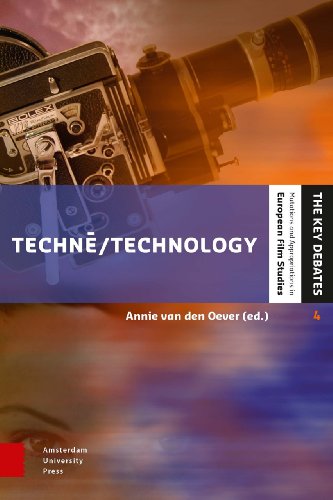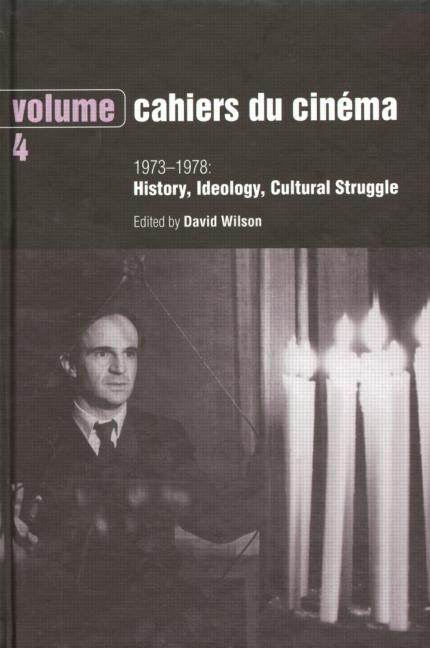Annie van den Oever (ed.): Technē/Technology: Researching Cinema and Media Technologies (2014)
Filed under book | Tags: · aesthetics, art, cinema, film, film theory, image, machine, media, media technology, media theory, perception, phenomenology, philosophy of film, philosophy of technology, photography, technē, technology, television, video, vision

“This fourth title in the series The Key Debates sets out where the term technē comes from, how it unleashed a revolution in thought and how the concept in the midst of the current digital revolution, once again, is influencing the study of film. In addition, the authors – among them André Gaudreault, Geoffrey Winthrop-Young, Martin Lefebvre, Dominique Chateau, Nanna Verhoeff, Andreas Fickers and Ian Christie – investigate how technologies have affected the major debates about film, how they affected film theory and some of its key concepts. This is one of the rare books to assess the comprehensive history of the philosophies of technology and their impact on film and media theory in greater detail.”
Publisher Amsterdam University Press, Amsterdam, 2014
The Key Debates: Mutations and Appropriations in European Film Studies series
Creative Commons BY NC ND License 3.0
ISBN 9089645713, 9789089645715
413 pages
Cahiers du Cinéma, vols. 1–4 (1951–78/1985–2000) & Special Issues in English (1966-67)
Filed under book, magazine | Tags: · aesthetics, cinema, film, film criticism, film history, film theory, philosophy of film




Cahiers du Cinéma [Notebooks on Cinema] is an influential French film magazine founded in 1951 by André Bazin, Jacques Doniol-Valcroze and Joseph-Marie Lo Duca. It developed from the earlier magazine Revue du Cinéma involving members of two Paris film clubs—Objectif 49 (Robert Bresson, Jean Cocteau and Alexandre Astruc, among others) and Ciné-Club du Quartier Latin. Initially edited by Éric Rohmer, it included amongst its writers Jacques Rivette, Jean-Luc Godard, Claude Chabrol and François Truffaut. (from Wikipedia)
This set of four volumes presents selected texts from the years 1951-1978 in English translation.
Cahiers du Cinéma: The 1950s: Neo-Realism, Hollywood, New Wave
An anthology from Cahiers du Cinéma, nos 1–102, April 1951 – December 1959
Edited by Jim Hillier
Publisher Harvard University Press, 1985
ISBN 0674090608
312 pages
Cahiers du Cinéma: 1960-1968: New Wave, New Cinema, Reevaluating Hollywood
An anthology from Cahiers du Cinéma, nos 103–207, January 1960 – December 1968
Edited by Jim Hillier
Publisher Harvard University Press, 1986
ISBN 0674090624
363 pages
Cahiers du Cinéma, Volume 3: 1969-1972: The Politics of Representation
An anthology from Cahiers du Cinéma, nos 210–239, March 1969 – June 1972
Edited by Nick Browne
Publisher Routledge, in association with the British Film Institute, 1990
ISBN 0415029872
352 pages
Cahiers du Cinema, Volume 4: 1973-1978: History, Ideology, Cultural Struggle
An anthology from Cahiers du Cinéma, nos 248–292, September 1973 – September 1978
Edited by David Wilson
With an Introduction by Bérénice Reynaud
Publisher Routledge, in association with the British Film Institute, 2000
ISBN 0415029880
323 pages
Publishers: Volume 1, Volume 2, Volume 3, Volume 4.
Volume 1 (1950s)
Volume 2 (1960-1968)
Volume 3 (1969-1972)
Volume 4 (1973-1978)
Cahiers du Cinema in English, ed. Andrew Sarris:
Number 1 (Jan 1966, 74 pp, 57 MB, via chef, added 2015-1-11),
Number 2 (Mar 1966, 82 pp, 65 MB, via chef, added 2015-1-12),
Number 3 (May 1966, 74 pp, 63 MB, via chef, added 2015-1-16),
Number 4 (Jul 1966, 66 pp, 57 MB, via chef, added 2015-1-16),
Number 5 (Sep 1966, 65 pp, 56 MB, via chef, added 2015-1-16),
Number 6 (Dec 1966, 66 pp, 57 MB, via chef, added 2015-1-16),
Number 7 (Jan 1967, 66 pp, 61 MB, via chef, added 2015-1-16),
Number 8 (Feb 1967, 68 pp, 44 MB, via LtJ),
Number 9 (Mar 1967, 65 pp, 59 MB, via chef, added 2015-1-17),
Number 10 (May 1967, 68 pp, 43 MB, via LtJ),
Number 11 (Sep 1967, 68 pp, 43 MB, via LtJ)
Number 12 (Dec 1967, 66 pp, 60 MB, via chef, added 2015-1-18)
See also: Daniel Fairfax: The Red Years of Cahiers du cinéma, 1968-1973 (2021).
Comments (5)John Mullarkey: Refractions of Reality: Philosophy and the Moving Image (2009)
Filed under book | Tags: · cognition, film, film theory, non-philosophy, ontology, philosophy, philosophy of film

Why is film becoming increasingly important to philosophers? Is it because it can be a helpful tool in teaching philosophy, in illustrating it? Or is it because film can also think for itself, can create its own philosophy? Indeed many film-philosophers claim that film does more than merely illustrate philosophical texts: rather, film itself can philosophize in direct audio-visual terms. Too often, however, when philosophers claim to find indigenous philosophical value in cinema, it is only on account of refracting it through their own thought: film philosophizes because it accords with a favoured kind of extant philosophy.
Refractions of Reality: Philosophy and the Moving Image is the first book to examine all the central issues surrounding the vexed relationship between the film-image and philosophy. In it, John Mullarkey tackles the work of particular philosophers and theorists (Žižek, Deleuze, Cavell, Bordwell, Badiou, Branigan, Rancière, Frampton, and many others) as well as general philosophical positions (Analytical and Continental, Cognitivist and Culturalist, Psychoanalytic and Phenomenological). Moreover, he also offers an incisive analysis and explanation of several prominent forms of film theorizing, providing a meta logical account of their mutual advantages and deficiencies that will prove immensely useful to anyone interested in the details of particular theories of film presently circulating, as well as correcting, revising, and re-visioning the field of film theory as a whole.
Throughout, Mullarkey asks whether the reduction of film to text is unavoidable. In particular: must philosophy (and theory) always transform film into pre-texts for illustration? What would it take to imagine how film might itself theorise without reducing it to standard forms of thought and philosophy? Finally, and fundamentally, must we change our definition of philosophy and even of thought itself in order to accommodate the specificities that come with the claim that film can produce philosophical theory?
Publisher Palgrave Macmillan, 2009
ISBN 0230002471, 9780230002470
282 pages

